How Testosterone reduces Procrastination (Patreon)
Downloads
Content
 </figure>
</figure>The most popular TED talk on the TED Youtube channel is Tim Urban of Wait But Why’s presentation titled Inside the mind of a master procrastinator.
<figure> </figure>
</figure>He basically explains that procrastination happens not because we’re irrational people, but because the “Rational Decision-Maker” gets distracted and sidetracked by the “Instant Gratification Monkey.” We know what we’re supposed to do, we know that we’ll feel so much better when that thing is done, but doing the thing is uncomfortable so the monkey very easily wins you over with some shiny new objects (behaviors). We know that doing the uncomfortable thing will be rewarding in the end, but we also know that the shiny new object will be rewarding straightaway, and is not nearly as uncomfortable to do.
<figure>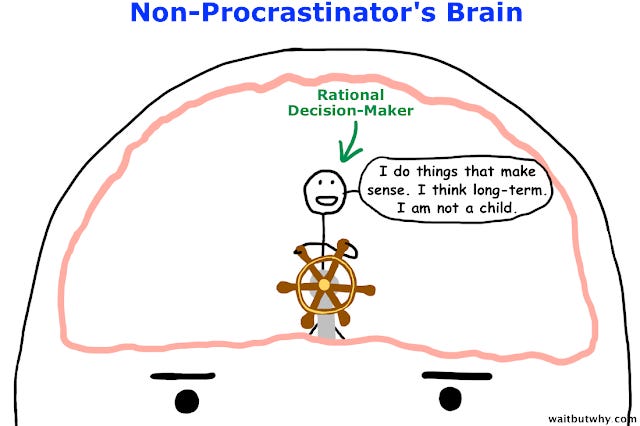 </figure><figure>
</figure><figure>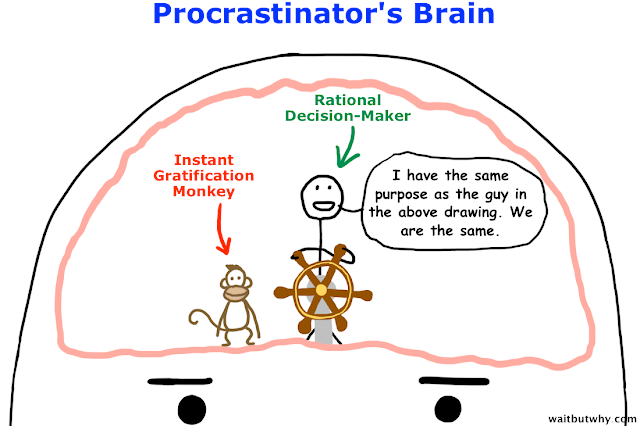 </figure>
</figure>How does anything ever get done then?
Tim says that’s where the panic monster comes in - when the deadline gets close enough and the reality of the repercussions of not doing the thing feel closer and more dangerous, we panic and finally do the thing. The discomfort of not doing the thing finally became far stronger than the discomfort of doing the thing and you get to action.
<figure>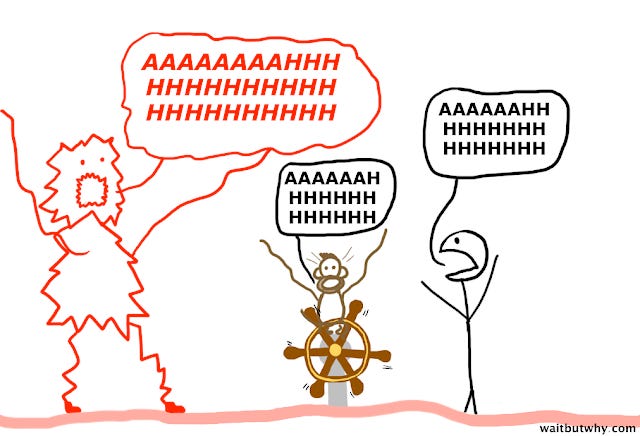 </figure>
</figure>According to a paper called State Anxiety and Procrastination: The Moderating Role of Neuroendocrine Factors, much of the literature suggests that procrastination is essentially a manifestation of anxiety with most studies consistently finding anxiety positively correlating with procrastination. Higher levels of anxiety are associated with higher levels of procrastination.
I think this is why I find L-theanine combined with caffeine to be great for writing. Caffeine is great for obvious reasons - it basically ‘speeds up’ the system, but I’m susceptible to the slight anxiety/jitters/body tension it can effect as I increase the dose of caffeine. (I do a deep dive on the anxiety-provoking effects my video titled Does coffee make you fat and anxious? ) L-theanine’s main effect is helping you relax without making you drowsy (likely via raising GABA), and many have found it effective for tamping down the slight anxiety that caffeine can provoke. Studies have found it to improve mood and focus. Research has found better memory and attention in people who combined L-theanine with caffeine rather than taking caffeine alone.
<figure>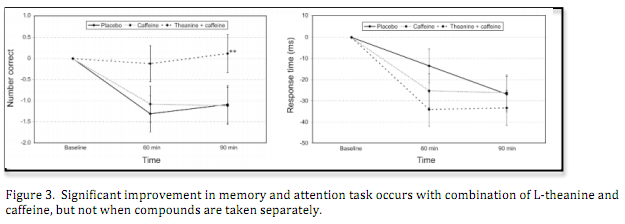 </figure>
</figure>Further there is evidence that L-theanine lowers trait anxiety.
<figure> </figure>
</figure>When you think of compounds that help you be more productive, you probably think of stimulants like ritalin or adderall that basically make you really alert. However, it’s a lot easier for me to do the fluid thinking necessary for creative work when I’m relaxed. I often procrastinate on my writing if I’m too tensed up. On some micro level, it feels like there is more instances of unconfident mental activity if I feel slightly more anxious. Ideas will come but they will quickly be vetoed by unconfident mental blips saying “they’re not gonna find that interesting, don’t write that.” With less anxious blips appearing in my mental space, the overall feeling is a more confident, more carefree “just write it and let’s see how it looks, you can edit it later.” This allows ideas to flow much more easily and I get way more done just trying things out rather than vetoing every sub-perfect idea. That is, with less anxiety, the writing process is more comfortable; less painful. There’s less friction to it; there’s less resistance.
Note: It’s hard to express these slight increases or decreases in anxiety - I’m not trying to oversell L-theanine. If 100 is a full blown panic attack, then the amount of anxiety I experience when sitting down to write is say a mild 8 and L-theanine brings this down to a slightly better 7.
So what does this have to do with testosterone?
It’s hard not to see testosterone as some sort of free magic that our bodies are just really stingy with. Testosterone increases muscle, decreases fat mass, reduces risk of diabetes, increases bone strength, improves mood, has been shown to be an effective anti-depressant, reduces anxiety, increases confidence, prevents cognitive decline, and increases focus, effort, and persistence.
Now of course a lot of this is context dependent - in a salesman, confidence will help them make the sale… but in a person who is already violent by nature, confidence can encourage them to pick the fight as they’ll think they have a good shot at winning.
 </figure>
</figure>When it comes to anxiety:
・Testosterone has been found to rapidly reduce anxiety in mice.
・A single dose (0.5mg) of testosterone decreased measures of fear in women.
・Administering testosterone makes anxious people more likely to engage in social situations that would otherwise make them uncomfortable
・Another study in the journal Psychoneuroendocrinology found that a single dose of testosterone abolishes implicit subordination, a feature of social anxiety.
・A case report on a man with generalized anxiety disorder with low testosterone reported that giving him 200 mg of testosterone every 2 weeks resolved his anxiety symptoms in a month.
・A review in Frontiers in Neuroendocrinology surmises that the reason women suffer from depression and anxiety at twice the rate of men is that they do not benefit from the mood-protective effects of testosterone.
This paper explains that social anxiety can the conceptualized as basically habitual subordination. That is, social situations make socially anxious people uncomfortable because they perceive themselves to be of a very low social rank. Testosterone is well known to have a lot to do with social ranking. That is, people who perceive themselves to be high in the social dominance hierarchy will have higher testosterone levels. For example in the context of the workplace, the CEO is likely to have the highest testosterone. Scientists have found that in primates, ranking in the social hierarchy is usually reflected very clearly by testosterone levels. The top dog primate will have the highest testosterone level and the guy on the bottom rung will have the lowest testosterone level.
<figure>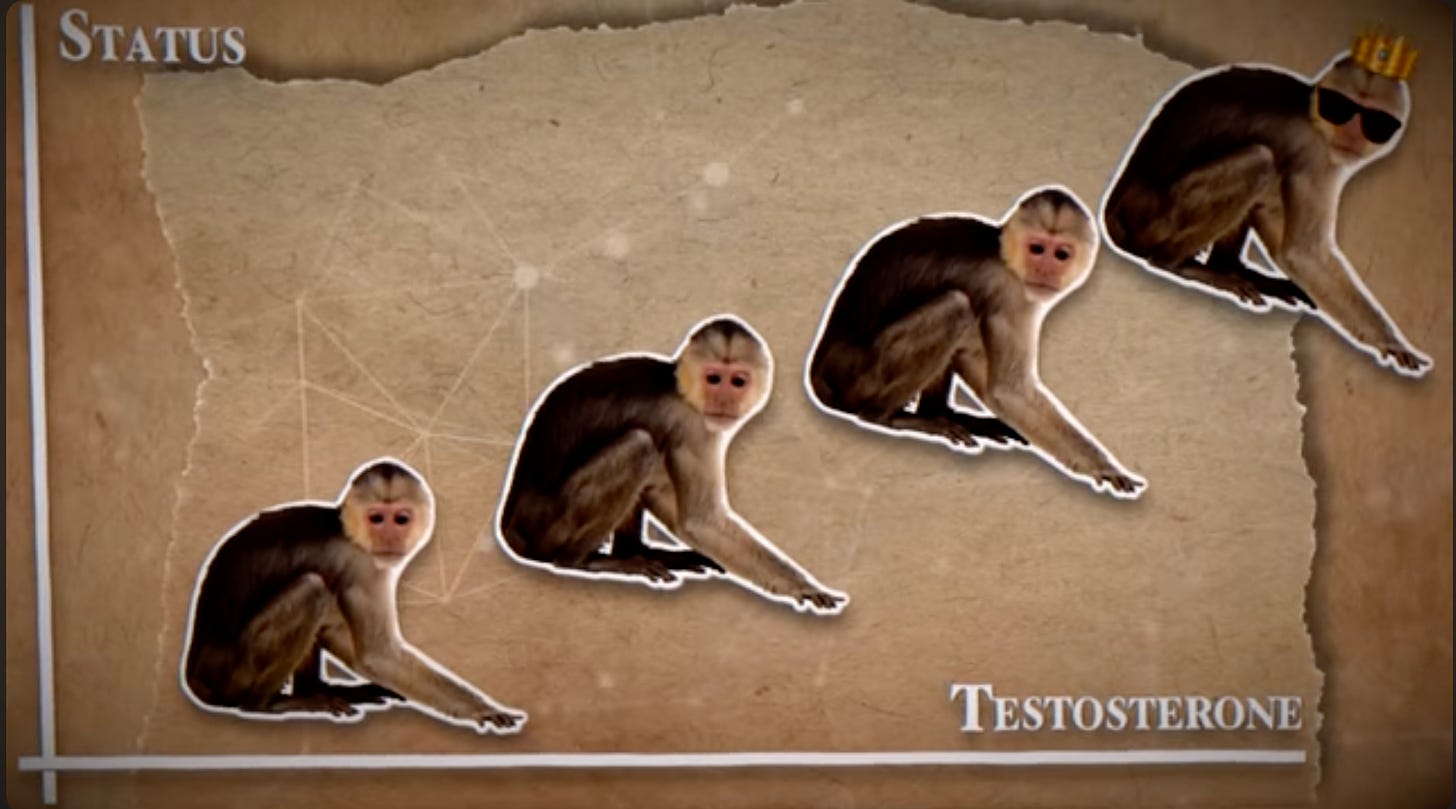 </figure>
</figure>So if social anxiety is essentially a manifestation of a perceived lack of social status and that perceived relative social status tracks with testosterone, then we should expect extroverted people to generally have more testosterone. Indeed, extraverted personalities have been linked to higher testosterone. One study on men in Senegal found “men in the top quartile of extraversion distribution having 29% higher testosterone levels.”
Personally, I’ve seen a noticeable shift in myself since taking on several natural testosterone-boosting practices. I wouldn’t say I was an introvert before but I wasn’t very proactive in trying to meet up with friends or going to parties, though I would still usually enjoy them if I got around to going. Now, I find myself more likely to reach out to friends and proactively set up meetings myself and more likely to want to join social gatherings without hemming and hawing about whether I should go. I’ve also noticed I procrastinate much less in general lately and have been way more productive.
<figure>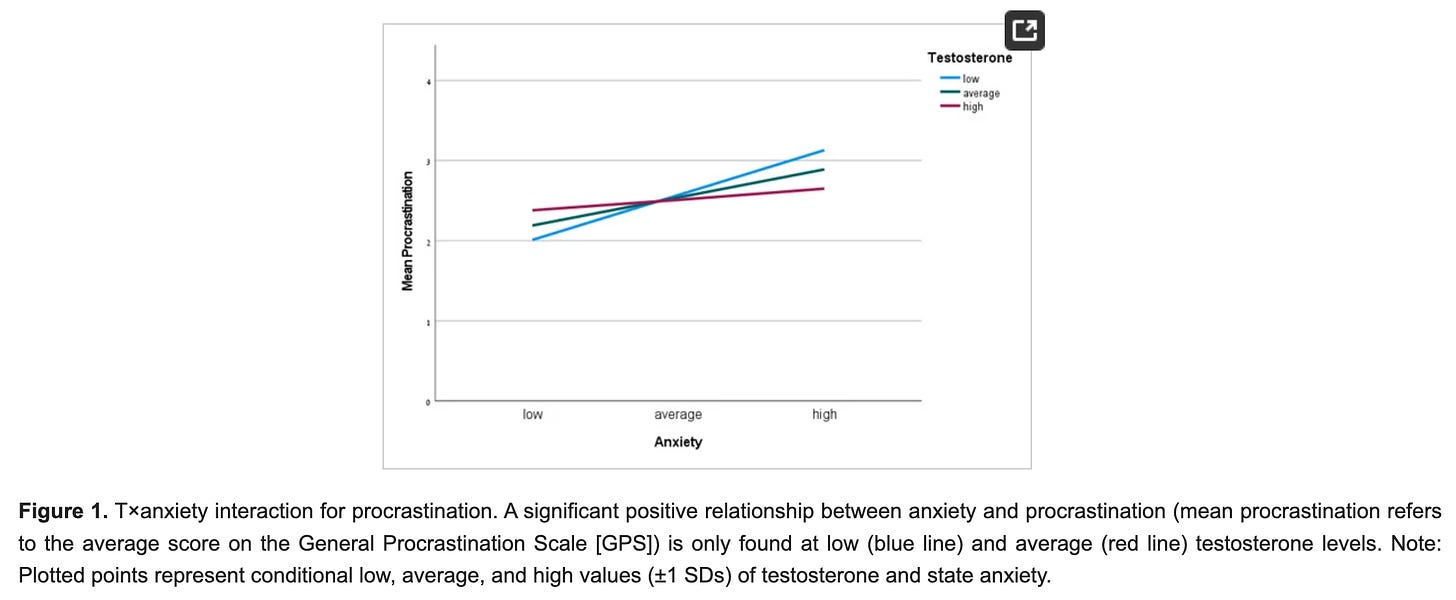 </figure>
</figure>So one way that testosterone would reduce procrastination is by reducing anxiety in general, but this study also found that higher testosterone will make people procrastinate less despite having anxiety. You could translate this as “working on this thing makes me uncomfortable for whatever reason, maybe I’m worried about the outcome or how my performance will be judged by others, but I’m going to do it anyways.” It could be considered a type of bravery - it makes them uncomfortable but they’ll do it anyways.
Of course there are a lot of factors at play here. Personality, motivations, values and so on will be a huge factor in whether someone procrastinates and what they procrastinate on. We don’t typically imagine the high-testosterone jocks in high school to be the type to sit down and do their homework without procrastinating. Then again, maybe they just don’t feel that homework is worth doing. Similarly, while there is a lot of research on the brain benefits of exercise, people don’t associate athletic jocks with intelligence or cognitive performance. Then again, jocks are likely just way more interested in (and get a lot of validation for being interested in) sports than say mathematics or biology.
I’m not saying we should take TRT so we can be super productive.
Just make sure you’re putting in the effort to cover the basics to support natural T production:
・Eat a nutrient dense diet
・Get sufficient sleep
・Hit the gym
・Don’t let your balls get too hot.